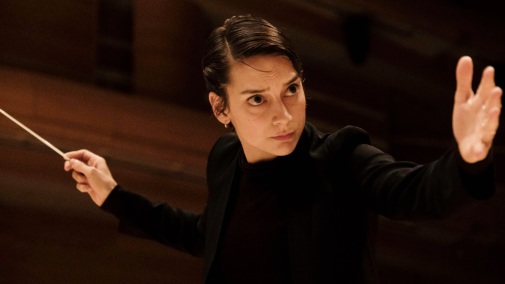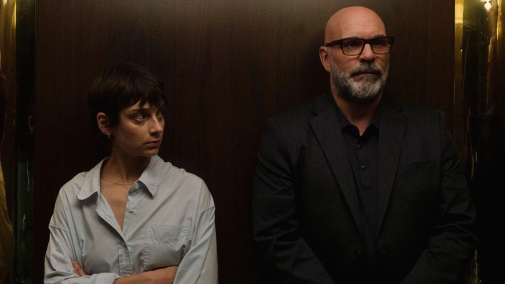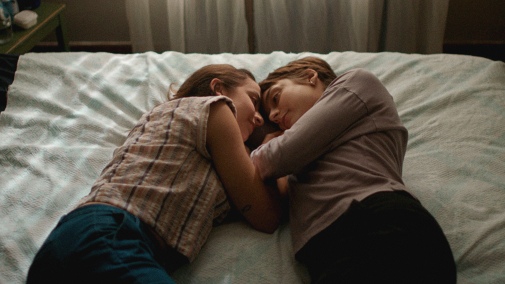TIFF ’23: “Days of Happiness” goes down a familiar road
 Saturday, September 9, 2023 at 8:00PM
Saturday, September 9, 2023 at 8:00PM 
You first notice sounds – the gurgle of running water, then the chirps of distant birds. It’s symphony-like, played by an orchestra with no maestro, though it’s through such a person we come to experience it. She’s Emma, a promising young conductor whose life is on the precipice of unraveling and to whose subjectivity Chloé Robichaud ties her new film. While the character’s vocation, sensitive ear, and relationship with a female cellist will inevitably draw comparisons to TÁR, Days of Happiness differs significantly from Todd Field’s Volpi Cup champion—the biggest distinction residing in the pictures’ narrative trajectory. One is about a public downfall, the other a private ascent…
Played by Sophie Desmarais, Emma is in possession of big eyes and a slight frame that make her look perpetually alert, even on the verge of panic. She’s the fight or flight instinct made in the image of a waif, Self-consciousness oozes from every pore, whether she's at an uncomfortable business lunch or practicing in front of the mirror. Only before her musicians does the background noise go away, taking with it the uneasy restraint with which Emma conducts her everyday life. In such moments, with an audience at her back, new confidence emerges, blooming with charisma she doesn’t otherwise project.
The actress lets this subtle shift in character go nearly unnoticed, seldom calling attention to it until a scene when the process is inverted and we find Emma falling apart, beautiful assuredness gone in the blink of an eye. Way before that disaster, earlier in the film, you’ll believe the conductor’s lover, Naëlle, when she calls her sexy while commanding the orchestra; the camera is as besotted as the cellist. If only her lover would acquiesce to Emma’s need for commitment. As we meet them, the single mother wants to keep her son and girlfriend apart, the shadow of a male ex forever looming over their lives. It’s been eight months, and Emma still feels her position in Naëlle’s life is transient.

She could hardly look to her parents’ relationship for cues on making the romance work since they are an even greater source of stress. Indeed, the conductor’s relationship with her father, who’s also her agent, shapes much of these Days of Happiness. In polar opposition to Emma’s demeanor, Patrick is overbearing, controlling his daughter with an iron fist and sharp words always at the ready on the tip of his tongue. While Desmarais lets her characterization simmer in low heat, allowing us to discover the conductor gradually, Sylvain Marcel chooses a blunter approach. Compared to his parodic take on René Angélil for Aline, the actor makes Patrick a collection of red flags proudly showing their colors for all to see. From soft-spoken paternalism to open viciousness, he’s a tyrant through and through.
The lack of synchronicity between father and daughter could benefit the film if it didn’t feel so at odds with the narrative. For example, the revelation of Patrick’s abuse aims for a slow-burn effect, culminating in a scene when they have a wordless dialogue through Mahler. Her trauma is exposed in art, and he’s in the audience, looking like a stake’s been pushed through his heart. Other textual details sketch cycles of abuse going back to the man’s childhood, toxicity passed from generation to generation. These are painful ideas whose exploration has clear value, but neither Marcel nor his director can articulate them without falling into cliché.
Furthermore, Days of Happiness does little with its specific milieu past the sound mix where Emma’s subjectivity most manifests. The visuals are all hand-held naturalism in that fashion so familiar of festival indies, close-ups so preponderant they sometimes block us from seeing the gesturing hands so crucial to conductors. During the Schoenberg fiasco, this becomes especially apparent. Perhaps this was meant to show disassociation, similar to how the camera’s resting tremor suggests the character’s unexpressed nervousness. However, the effect is more distracting than elucidating. The same goes for the overuse of flashbacks and cutaways, a clumsy strategy perpetuating the adage that great art is born from pain.

Sorry for returning to this comparison, but for all I griped about TÁR last season, its construction had a formal discipline befitting its exacting protagonist. Its textual mysteries, even contradictions, were an endless source of discussion even for those who didn't love the picture. Leaving Days of Happiness behind, it’s hard to imagine having anything to reflect upon. What would one discuss? Not its visual idioms, certainly not the bookending symbolism. Maybe you could hold on to the emotional honesty of the exercise, but I have my doubts. As it stands, the film’s drama is so pre-digested that it precludes the desire to revisit Emma’s undercooked story. Only Desmarais’ performance demands serious appreciation, standing tall above the rest. Brava, Maestra!


